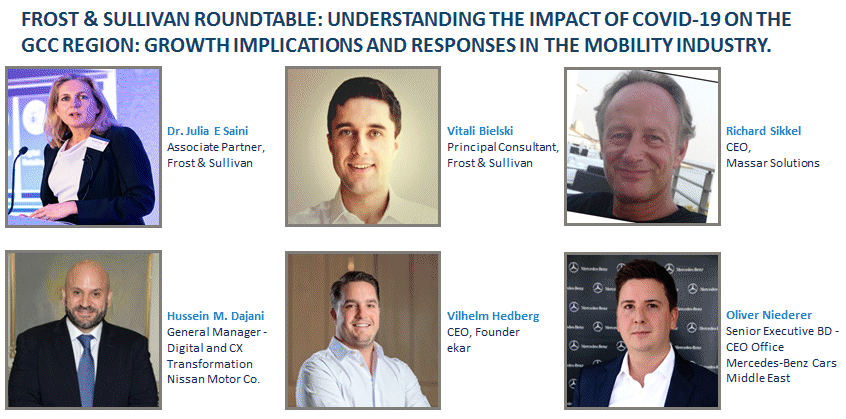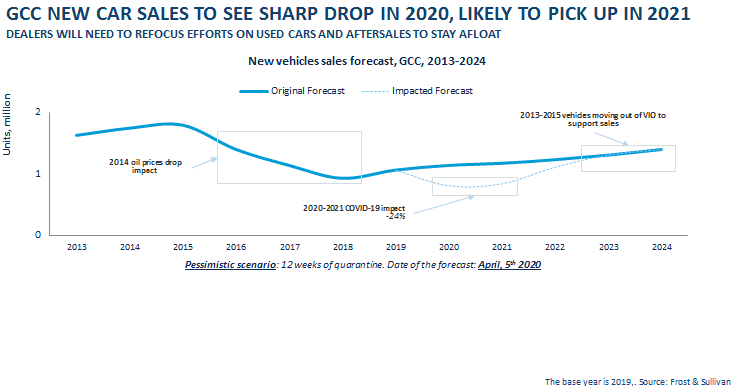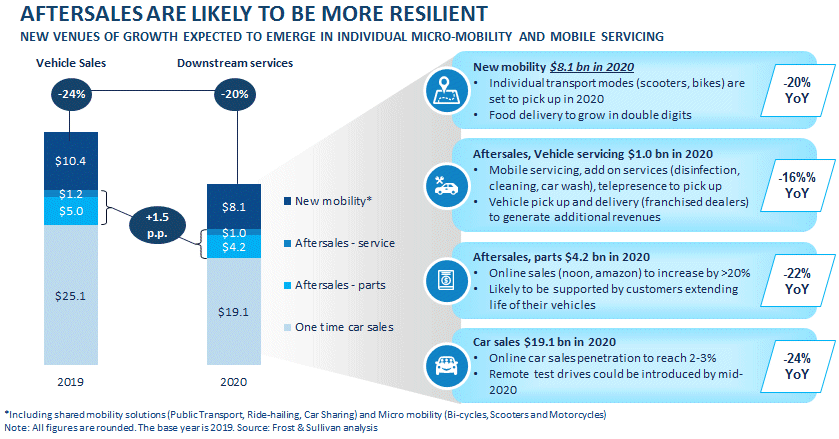Digital Transformation will be at the “core” of industry’s comeback, along with new business models & value-added services, reveals Frost & Sullivan roundtable
Since the time COVID-19 has swept the GCC, new car sales have plummeted by 50-60%, average daily footfalls at vehicle showrooms have fallen from 10-12 to 2-3 customers, average vehicle servicing spend has declined from around USD 390 to USD 325, while jittery consumers have given a wide berth to shared mobility and public transportation modes.
At a recent Frost & Sullivan Roundtable on Understanding the Impact of COVID-19 on the GCC Region: Growth Implications and Responses in the Mobility Industry, leading mobility players in the GCC, including Ekar, Massar Solutions, Nissan and Mercedes-Benz, sent out a strong message focused on response, recovery, resilience and resurgence.
Dr. Julia Saini, Associate Partner, Frost & Sullivan moderated the roundtable which delved into the unprecedented challenges and growth opportunities, business models and services arising out of the COVID-19 outbreak. The far-reaching discussions also touched on innovative automotive retailing paradigms, the role of COVID-19 in catalyzing digitization initiatives, transformations in internal and external business fundamentals, and the likely future of the automotive industry in a post COVID scenario.
Co-presenters Dr. Saini and Vitali Bielski, Principal Consultant with Frost & Sullivan’s Mobility practice, cautioned that the immediate fallout of the COVID-19 crisis will be declining vehicle sales in the GCC, with Frost & Sullivan forecasting a sharp drop of almost 24% in new car sales in 2020 from 2019 levels. In March of this year alone, sales of new and used cars decreased by 50%- 80% as a result of consumers postponing vehicle purchases. Moreover, in a trend that could have both short and longer-term consequences for traditional vehicle sales approaches, anxieties over social distancing underpinned an almost 70-80% reduction in consumer traffic to showrooms.
Meanwhile, vehicle servicing and parts demand have been affected by stay at home restrictions. Although more resilient, these two segments will be challenged by consumers deferring periodic maintenance of their vehicles and by lowered demand for replacement parts as a result of the fewer number of miles travelled and associated deceases in wear and tear. Such trends are reflected in Frost & Sullivan analysis which reveals there was a 3/4th fall in consumer walk-ins for periodic maintenance and a 50% reduction in parts enquiries across the GCC in March 2020.
Despite this challenging environment, the industry remains cautiously optimistic. Prospects are positive from multiple perspectives, including both internal, i.e., the industry’s inherent resilience, and, external, i.e., the urge for “revenge travel” once lockdowns are lifted. Additionally, the need to replace the nearly 3.5 million vehicles purchased during the GCC automotive industry’s boom years of 2014-2015 will rally market volumes to pre-COVID forecast levels by 2023.
Dr. Saini highlighted that digital transformation will be at the core of the industry’s comeback. An accelerated shift towards digital services is already evident, accompanied by new business models and value-added services. Stakeholders are assessing quick online services, new digital interfaces and select digital elements that will expand customer touch points, streamline the customer journey from purchase to delivery, and create more meaningful customer experiences. In parallel, business models like contactless delivery, delivery aggregation, and contactless parts/services delivery are gaining traction.
To arrest declining new vehicle sales and retain brand loyalty, proactive strategies are focusing on leasing and co-ownership, reinforced by flexible contract terms and easy payment plans. Simultaneously, OEMs are also exploring the potential of used car sales and used car leasing.
On the one hand, health and wellness trends have had a positive impact on micro-mobility modes, particularly e-scooters and e-bikes, for personal mobility and for food/goods delivery. Frost & Sullivan anticipates new mobility, comprising micro-mobility and shared mobility, to generate just over $8 billion in revenues in 2020.
On the other hand, new health and safety trends have negatively affected shared mobility modes, both private and public, with Frost & Sullivan research revealing a 69% drop in mobility to public transport hubs over the mid-February to late March period. In response, shared mobility companies are repurposing their fleets for essential services delivery or to transport healthcare workers, building a positive brand image in the process.
Amidst declines in aftersales services and parts revenues in 2020, new streams of growth are emerging. Mobile servicing, value-added services like disinfection, cleaning and car wash, along with vehicle pick-up and delivery services will sustain aftersales and vehicle servicing, while online sales and extended vehicle use will support aftermarket parts revenues
Fleet Repurposing as a New Business Model
For obvious reasons, shared mobility has taken a pounding from the COVID-19 crisis. So how are car sharing start-ups like Ekar—which, prior to the Dubai government’s mandate to halt fleet operations, had its highest ever utilization rates in the UAE—responding? Despite the nearly 70%-80% fall in trips due to lockdown measures, Vilhelm Hedberg, CEO & founder of Ekar was bullish about the segment and his company’s prospects citing the clear uptick in longer term bookings; a “hoarding of cars” scenario with customers now reserving cars for longer durations of weeks/months/ years.
Echoing trends in Europe, Hedberg also pointed out that Ekar has addressed the steep drop in trips by repurposing its fleet. Almost 50-100 cars have been redirected towards healthcare workers in the UAE and healthcare/military personnel in Saudi Arabia. While the need for special permits and delivery vehicles has put paid to the company’s idea of moving into food delivery in Saudi Arabia, it has been exploring the short-term potential of diverting its fleets into newspaper/household goods delivery.
Redirecting vehicle use to essential services is also a strategy being followed by Massar Solutions. Richard Sikkel, CEO, Massar Solutions underlined that most of Massar’s fleet is currently involved in essential services provision, including 1500 drivers who are dedicated to carrying out grocery / food delivery for Carrefour, besides fleet transport support to government utility workers in Abu Dhabi.
Simultaneously, with a focus to maintaining long-term relationships and working for the community in these testing times, Massar has redirected vehicles from customers who are unable to pay / use the vehicles to customers delivering perishables / essential commodities. The company has also taken back leases from private individuals who are currently unable to make payment and offered them at highly discounted rates to essential workers.
Focus on Hygiene Standards to Ensure Business Continuity
Health, safety & hygiene have become paramount as the pandemic continues to rage. Accordingly, Frost & Sullivan has continuously emphasized the need for new mobility solution providers to increase communication on hygiene standards, and offer customers a safe alternative to public transport modes. In line with this thinking, Ekar’s focus has been on highlighting the uniquely safe and clean environment of shared vehicle / car sharing services, in contrast to ride-hailing.
Massar has a similar perspective. Recognizing that business continuity for customers is dependent on a healthy workforce, the company has been extremely conscious of the health, safety and hygiene of its employees. This has taken the form of regular testing for drivers and workers and more dispersed accommodations for essential services drivers.
Digitization Initiatives that Keep the Customer Front & Center
With most showrooms closed and customers now wary of social interaction, traditional sales and marketing approaches will need to be urgently revisited. In this context, one of the cornerstones of evolving customer expectations will be access to a range of digitally-enabled experiences and services. Apart from streamlining processes, such services fold into more holistic and long-term approaches to communicate more meaningfully with customers, rebuild customer confidence and, ultimately, generate sales.
Oliver Niederer, Senior Executive BD, CEO Office, Mercedes-Benz Cars, Middle East indicated that declining customer footfalls in showrooms have acted as a catalyst for digitalization and e-commerce initiatives. The company has been pushing such initiatives as it seeks to explore new avenues of communication, drive sustained long-term growth, and assess new, digitally-driven growth opportunities.
Consequently, Mercedes-Benz has been actively planning strategies, designing products, and developing new business models. This approach also reflects the philosophy that the most successful companies boost R&D investments during crises to fuel innovation-driven growth over the long-term.
While making the point that the key challenge for organizations would be to recognize and be fully responsive to new customer demands shaped by the COVID-19 crisis, Hussein M. Dajani GM; Digital and CX Transformation, Nissan Company highlighted Nissan’s comprehensive, customer-focused response strategies. Using a series of online, digital and mobile solutions ranging from chat tools and virtual showrooms to e-commerce, Nissan has sought to improve comfort levels, keep open channels of conversation and provide reassuring messages to customers at every single touchpoint. Among these solutions include video calls with sales consultants, test drives at home, door-to-door service maintenance and service pick-up and delivery from the customer’s home.
Interestingly, all roundtable participants underlined that, at this juncture, rather than revenues, the focus is on customer wellbeing. Mercedes through its connected cars and Nissan on its websites have embarked on courageous public service campaigns that urge customers to minimize car use, and ‘stay home, stay safe.’ Massar’s strict testing of staff and drivers to ensure that customers are protected from the spread of the virus and Ekar’s continual commitment to vehicle sanitization have stressed how customers are at the front and center of response agendas.
Maintaining Liquidity and Government Support
One of the inevitable questions that came up during the roundtable discussion was how equipped automotive companies were to ride out the crisis, especially if lockdown measures were prolonged? Hedberg averred that start-ups who depended on investor money are particularly vulnerable in this uncertain economic climate. He was hopeful, therefore, that despite being, theoretically, “the lowest on the food chain for government support,” the UAE government would proactively expand on its earlier initiatives, like lower prices on trade licenses for start-ups.
On the other end of the spectrum, Sikkel said that Massar has been relatively insulated from the current crisis since most of its contracts are long-term and many of its customers still active. That said, one of the first crisis response actions taken was to ensure maximum liquidity with the aim of protecting company assets, maintaining services, keeping staff onboard and ensuring business continuity for customers. As a result, Massar is well positioned to cope with an extended lockdown.
Both Nissan and Mercedes-Benz stated that their responses were being calibrated according to the imperatives of individual country markets.
Redefining Internal Organizational Dynamics
Across the board, one of the most tangible responses in the aftermath of COVID-19 has been to focus on employee care and safety through welfare programs and favorable work-from-home policies.
In order to keep a dispersed workforce engaged and connected, Mercedes-Benz has launched a weekly newsletter, holds regular digital townhall meetings, has fun initiatives like a fitness challenge, and encourages employees to take courses for personal and professional development.
Apart from such shifts in internal communication, another defining outcome of the pandemic, as Dajani noted, has been the dissolving of organizational silos. Organizations are now working together as one team, continuously communicating and sharing information, in turn, enabling more effective and dynamic strategic responses.
Strategic Roadmaps for the Future
Ultimately, understanding the unique impact and implications of the COVID-19 crisis is not enough. Equally critical is being able to sift through a range of potential strategies in order to identify the ones best suited to optimize resource and operational efficiencies, mitigate risk, and embed them in a roadmap for sustained future growth.
Much like our roundtable discussants highlighted the immediate priority for OEMs and dealers should be to ensure the health and safety of their workforce, customers and assets. An early start to Ramadan promotions, coupled with credit /financial support across the ecosystem of manufacturers, dealers, suppliers and customers, will also help contain the fallout from the pandemic.
In the medium-term, OEMs and dealers should shift focus onto high-growth areas, including digital retail of cars, parts and services; mobile servicing, and auto care concierge services. Strengthening used car sales and used car leasing will also provide a much needed revenue boost.
Over the long-term, diversifying supply chains, ramping up in-vehicle connectivity and health, wellness and wellbeing (HWW) solutions, and freeing up working capital by expanding the share of online business will strengthen the foundations of OEMs and dealers.
Again, as underscored in the roundtable discussion, the immediate response for mobility solutions providers should be to repurpose existing fleets and improve hygiene standards. Car sharing companies can renegotiate deals with OEMs, while accelerated fleet renewals through leasing companies and OEMs, increased fleet utilization through expansion into food / goods delivery services, and enhanced focus on individual mobility modes should feature as elements of more long-term plans.
Overarching this, all mobility stakeholders need to be fully prepared for, and insulated from, any similar eventuality in the future. Central to such future shock-proofing, will be to develop and regularly update comprehensive contingency plans.
Key findings documented by – Dr. Julia Saini, Associate Partner, Frost & Sullivan
Frost & Sullivan on COVID-19:
Frost & Sulivan is working overtime in providing clients with comprehensive scenario-based analyses on the global economy and key markets to help them survive the current crisis.
If you would like to schedule a one-on-one with our mobility team experts to help you through these turbulent times, please email Nimisha Iyer, Marketing Communications at nimisha.iyer@frost.com








